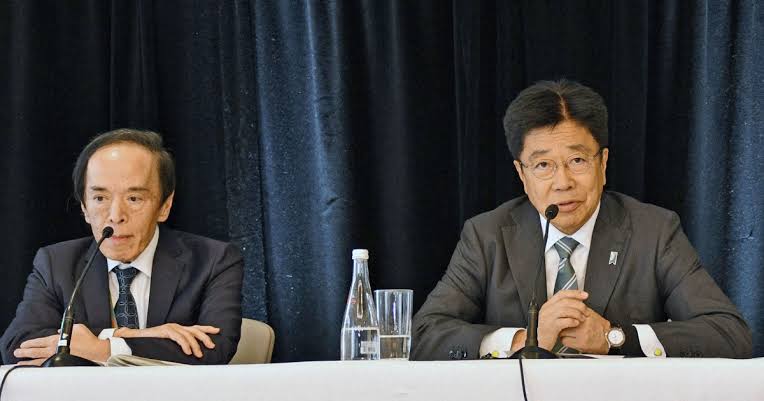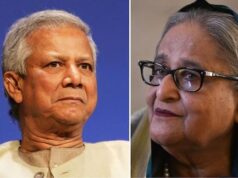G20 vows to resist protectionism in Trade

Bank of Japan Governor Kazuo Ueda, left, and Japanese Finance Minister Katsunobu Kato attend a press conference in Washington on Oct. 24, 2024
Finance chiefs from the Group of 20 major economies pledged Thursday to resist protectionism, amid the stabilization of global growth despite increased geopolitical risks.
Following a two-day meeting in Washington, the finance ministers and central bank governors of the leading developed and emerging economies said they see “good prospects” for a soft landing of the global economy, citing positive developments such as inflation declining from elevated levels in many parts of the world.
However, they also warned of many challenges ahead, including wars, rising commodity prices and climate change. The group, which includes Russia, refrained from mentioning specific conflicts such as ongoing conflict between Ukraine and Russia.
Brazil, chair of this year’s G20 discussions, released a separate statement saying some members expressed their views on Russia and Ukraine, as well as the situation in the Gaza Strip, noting “these issues have an impact on the global economy.”
“We commit to resist protectionism and encourage concerted efforts to support a rules-based, non-discriminatory, fair, open, inclusive, equitable, sustainable, and transparent multilateral trading system,” the finance chiefs said in a joint statement.
They added that the World Trade Organization should be at the system’s core.
Their pledge came just after the BRICS meet and less than two weeks before the U.S. presidential election, with former President Donald Trump, the Republican nominee, promising to impose a 60 percent tariff on goods from China and an across-the-board levy of 10 to 20 percent on all imports from every country in the world.
Bank of Japan Governor Kazuo Ueda said at a press conference that a number of finance chiefs had expressed concern about the uncertainty of the election and economic policy under the next administration.
Many mainstream economists have said the prospects for a trade war will increase if Trump is elected and implements his pledges.
His Democratic rival, Vice President Kamala Harris, has suggested that high tariffs on some Chinese goods imposed by the current administration on national security grounds will remain in place.
While Harris has acknowledged that such duties are effectively a “sales tax” on U.S. consumers as they make domestic prices higher, both candidates favor such measures to protect companies and workers in the United States from foreign competition.
Brazilian central bank chief Roberto Campos Neto, who co-chaired the latest talks, also touched on the U.S. election during a press conference at the close of the meeting, held on the sidelines of the International Monetary Fund and the World Bank’s annual autumn meetings.
He said three issues brought up by both candidates — migration, fiscal expansion and protectionism — could raise inflation in the world’s largest economy.
Although the finance ministers and central bankers agreed economic activity has proved to be more resilient than expected, they cautioned that “growth has been highly uneven across countries.”
“We are concerned that medium and long-term global growth prospects are below historical averages,” their statement said.
On the yen’s renewed weakness against the U.S. dollar and other currencies, Japanese Finance Minister Katsunobu Kato said at a press conference that he had told his counterparts it is necessary to pay attention to “excessive fluctuations” in the foreign exchange market.
Kato, who assumed his post earlier this month, held a bilateral meeting with U.S. Treasury Secretary Janet Yellen and agreed to communicate closely with her on foreign exchange issues, according to Atsushi Mimura, Japan’s top currency diplomat.
Ueda, who met the press with Kato, said he will carefully assess the impact of the yen’s depreciation on prices and monetary policy, while keeping close tabs on external factors such as U.S. economic trends and the outcome of the presidential election.
Ueda also said there is “plenty of time” to make a decision on an additional interest rate hike in Japan.




